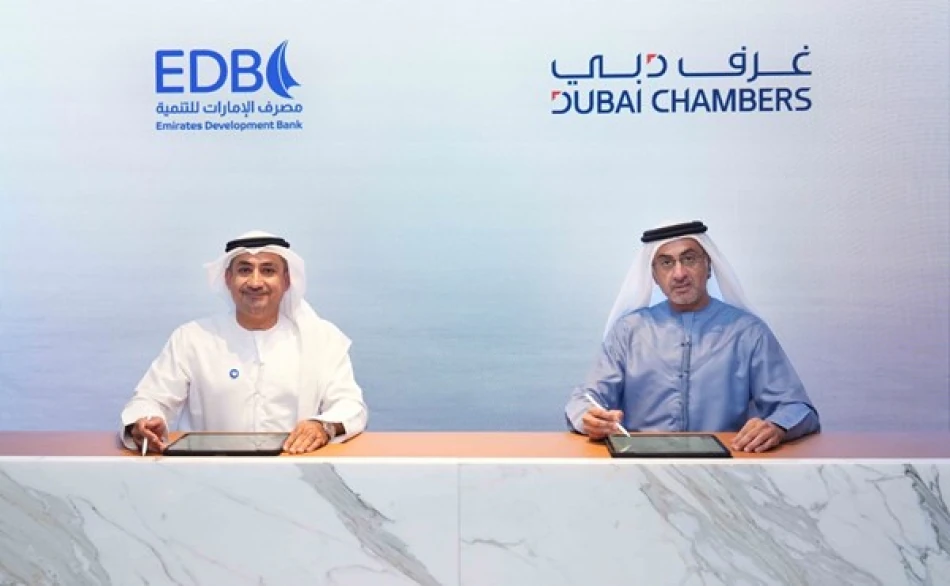
Dubai Chambers and Emirati Development Authority Forge Partnership to Empower Startups
Dubai Chambers and Emirates Development Bank Unite to Supercharge SME Growth
Dubai is doubling down on its commitment to small and medium enterprises with a new strategic partnership between Dubai Chambers and Emirates Development Bank (EDB). The agreement promises comprehensive financial solutions, streamlined banking services, and preferential treatment for local businesses—a move that positions Dubai as an increasingly attractive hub for entrepreneurs and multinational corporations seeking Middle Eastern expansion.
A Comprehensive Support Ecosystem
The partnership goes beyond traditional banking relationships, creating what amounts to a one-stop shop for business development in Dubai. Under the agreement, EDB will provide tailored financing solutions covering everything from startup capital to operational expenses and capital expenditure for existing businesses.
The collaboration specifically targets the often-overlooked middle market—companies that have outgrown basic startup support but aren't large enough to command attention from major international banks. This segment represents a critical growth engine for Dubai's economy, particularly as the emirate diversifies away from oil dependence.
Digital-First Approach
EDB's digital banking platform, EDB 360, will serve as the technological backbone of this initiative. The platform promises to simplify account opening and daily operations management—addressing one of the most common pain points for businesses entering the UAE market. Historically, banking bureaucracy has been a significant barrier for international companies seeking to establish operations in the region.
Strategic Timing in a Competitive Landscape
This partnership emerges as regional competition for business-friendly environments intensifies. Saudi Arabia's Vision 2030 and Qatar's diversification efforts have created pressure on Dubai to maintain its edge as the region's commercial capital. The emirate's response appears focused on removing friction from the business establishment process while providing ongoing financial support.
The initiative mirrors successful models in Singapore and Hong Kong, where government-backed development banks work closely with chambers of commerce to create integrated support systems. However, Dubai's approach appears more comprehensive, particularly in its emphasis on cross-border trade financing—a natural fit given the emirate's role as a regional trading hub.
Market Implications and Investment Outlook
For investors and multinational corporations, this partnership signals Dubai's commitment to maintaining its competitive advantages in an increasingly crowded field. The preferential treatment for Dubai Chamber of Commerce members creates tangible incentives for formal business registration and engagement with local institutions.
The focus on trade finance solutions particularly benefits companies using Dubai as a gateway to broader Middle East, Africa, and South Asia markets. With global supply chains continuing to evolve post-pandemic, Dubai's positioning as a logistics and financial services hub becomes increasingly valuable.
Sector-Specific Benefits
Technology startups and fintech companies stand to gain significantly from streamlined banking processes, while traditional trading companies will benefit from enhanced trade finance options. The partnership also addresses working capital needs—crucial for businesses navigating the region's often extended payment cycles.
Long-Term Economic Strategy
This collaboration reflects Dubai's broader economic diversification strategy, moving beyond its traditional strengths in real estate, tourism, and re-export trade. By nurturing a robust SME ecosystem, Dubai aims to build more sustainable, innovation-driven economic growth.
Khalid Al Jarwan, Deputy President of Commercial and Institutional Services at Dubai Chambers, emphasized the initiative's role in creating an integrated service ecosystem designed specifically for private sector needs. Meanwhile, Shaker Zainal from EDB highlighted how the partnership expands access to specialized financing solutions while supporting the UAE's broader economic priorities.
The success of this partnership will likely influence similar initiatives across the Gulf region, as governments increasingly recognize that SME support requires coordinated efforts between public and private sector institutions rather than isolated programs.
Most Viewed News

 Layla Al Mansoori
Layla Al Mansoori






